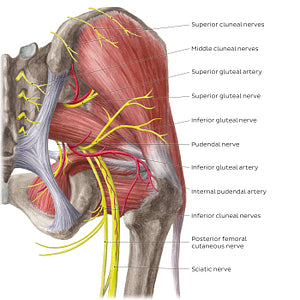Liene Znotina
Neurovasculature of the hip and thigh (posterior view) (English)
Neurovasculature of the hip and thigh (posterior view) (English)
Arterial supply to the lower limb starts in the pelvis with the common iliac artery. This quickly splits into two divisions, the external iliac artery and the internal iliac artery. The internal iliac artery provides branches to the pelvic and gluteal regions, as seen here with the superior and inferior gluteal arteries, while the external iliac artery continues to descend into the thigh as the femoral artery. The hip itself is supplied by a periarticular anastomosis, formed by branches of the femoral artery (the medial and lateral circumflex femoral arteries), and branches of the internal iliac artery (the obturator, superior gluteal and inferior gluteal arteries). The posterior thigh is supplied by branches of the femoral artery, specifically by perforating arteries which branch from the deep femoral artery. Innervation to the posterior hip and thigh regions is supplied either by direct branches from the sacral plexus (such as the posterior femoral cutaneous nerve and the gluteal nerves) or by muscular branches of the sciatic nerve, which arise before its bifurcation into the common fibular nerve and tibial nerve. The sciatic nerve does not provide any cutaneous innervation to the posterior thigh; instead this is provided solely by the femoral cutaneous nerves: the posterior femoral cutaneous nerve (sacral plexus) and by the anterior and lateral femoral cutaneous nerves (lumbar plexus).
Precio habitual
$7.56 USD
Precio habitual
Precio de oferta
$7.56 USD
Precio unitario
por
No se pudo cargar la disponibilidad de retiro


#E2DE26
#A85A55
#A41A27
#5A2928
#E5E099 y #C7B6AE

